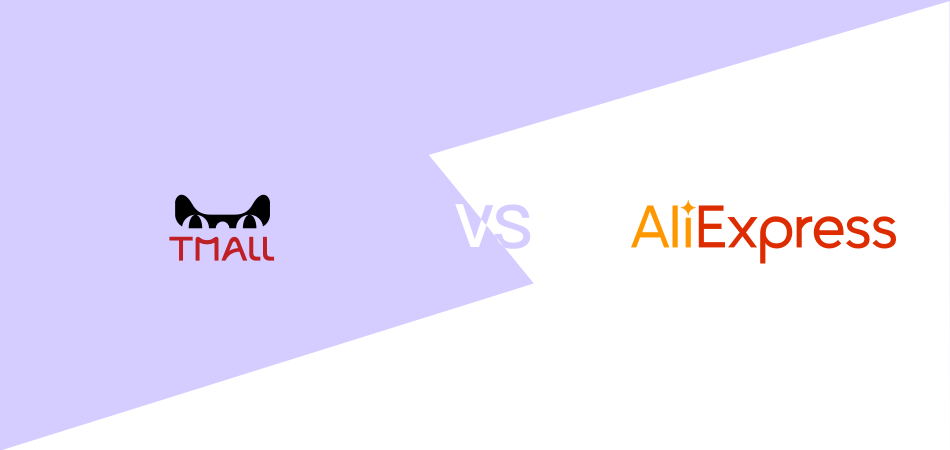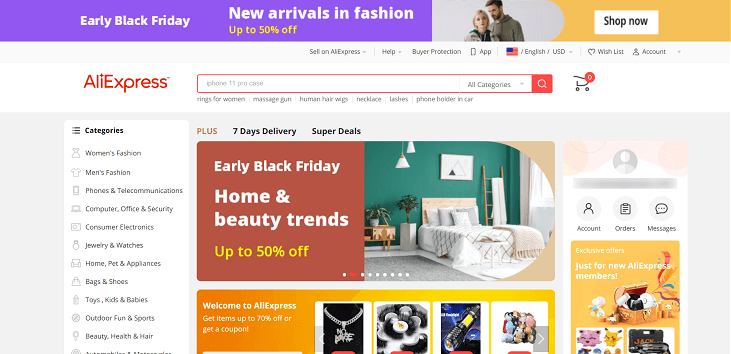Tmall vs. AliExpress: What Are the Differences Between Them?

Tmall and AliExpress are 2 of the most popular eCommerce websites with both sellers and buyers in China and worldwide. Although they are both eCommerce platforms for purchasing products, they have different points you should know before choosing one for selling or buying. Let’s find out what are the differences between Tmall and AliExpress.
Tmall vs. AliExpress: The Basics
Before deep diving into their differences, let’s look at the overview of Tmall and AliExpress.
What Is Tmall
Tmall (天猫), established in 2008 and a part of the Alibaba group, is the most significant Chinese eCommerce site. It is a division of the online store Taobao (淘宝网). The majority of its target market is B2C (Business-to-Consumer). The idea behind Tmall is bold and clever since it enables local and foreign businesses to sell their products on the platform in mainland China, Hong Kong, Macau, and Taiwan. Tmall distinguishes itself from its rivals because of its high requirements for reputation and quality.

Because it was created specifically for companies with certified brands and other legal documentation, Tmall differs from other eCommerce platforms. The consumer also gains because they can be sure they purchase authentic products from the brand when they shop on Tmall.
What Is AliExpress
Owned by the Alibaba group, AliExpress is a shopping website with a presence in China and oversea. Products are not directly sold to customers on AliExpress. Instead, it functions more like a directory of thousands of small businesses and independent sellers who may use the website for marketing their items and conducting business with clients throughout the globe.

Many items are offered at factory pricing, typically exclusively accessible to merchants. However, you do not need to use a specific retail account or make large purchases to shop on AliExpress.
The buying experience on AliExpress is identical to that on other online stores like Amazon or eBay. There are a huge number of sellers on the platform, each with its own storefront.
Tmall vs. AliExpress: Similarities
Both are marketplaces operated by the Alibaba Group, which links buyers and sellers. The eCommerce and cloud computing industries have the most striking and significant commonalities between Tmall and AliExpress.
There will be some overlap in the two main market segments where the two platforms will continue to compete. In the respective domestic markets of each platform, neither is probably going to make a lot of progress. The real conflict will take place away from their home markets.
Tmall vs. AliExpress: Product Sourcing
If you choose product sourcing from China, it’s a good idea to consider these 2 eCommerce platforms.
Product Sourcing on Tmall
Let's talk about the legal restrictions you must abide by when purchasing from Tmall now that you have a better understanding of sourcing from Tmall.
These regulations might be confusing if you belong to the category of new vendors. To address that, you have put together a list of guidelines you must always abide by.
- Obtain essential permits
- Ensure your products can be imported and are not banned
- Know the regulations of your products
- File importing documents
- Paying duties
It can be easily seen that the sourcing process on Tmall is stricter but more secure for both buyers and sellers.
Product Sourcing on AliExpress
AliExpress is frequently used for this purpose even though it is not a sourcing site in the conventional sense, especially by businesses looking to buy in small quantities. Vendors on AliExpress may be corporations or private citizens, making it challenging to authenticate suppliers and raising the risk of fraud.
It is strongly advised to order a sample product first if you intend to dropship products from AliExpress because the quality of the products can vary. You can order from that seller and have them send items directly to your customers after you've checked the items yourself.
Tmall vs. AliExpress: Price
Price is one of the most important things for both buyers and sellers when evaluating an eCommerce website.
Product Prices on Tmall and AliExpress
Prices on both platforms are also reasonable for any buyers. You can get vouchers and discounts on many occasions at attractive prices.
The price currency on Tmall is ¥ and is most suitable for domestic Chinese buyers. Meanwhile, the price currency on AliExpress is more varied, like USD, ¥,... The prices on AliExpress are more comfortable for overseas buyers. You will not need to worry about foreign currency rates when referencing prices.
Selling Fees on Tmall
The costs associated with selling your products on Tmall might be rather high. However, if you have the appropriate plan, it is often worthwhile.
- Tmall flagship store: Costs for a Tmall Flagship Store range from 50,000 to 100,000 RMB.
- Marketplace: Between 100,000 and 150,000 RMB.
- Technical services: You'll pay between 30,000 and 60,000 RMB annually for technical services.
- Commission fees: The commission on sales on Tmall can range from 0.5% to 10%, but it typically falls between 2% and 5.5%.
- Payment rate: Alipay is an Alibaba affiliate based in China. This indicates that 1% of your overall sales will go to Alipay.
Selling Fees on AliExpress
Selling on AliExpress has clear and well-defined costs. Only things that sell will earn commission payments from you. Both listing and maintenance costs are waived.
Just a fixed commission as a percentage of the total sales price is what you pay. This rate fluctuates by category (and occasionally by subcategory), but it typically ranges from 5% to 8%.
Examples broken down by category include:
- Fashion and accessories: 5% to 8%.
- Furniture: 5%.
- Consumer electronics: 5% to 8%.
- Home appliances: 5%.
- Baby products: 8%.
- Sports: 5% to 8%.
Tmall vs. AliExpress: Product Categories
Both include almost all the basic product categories as many other eCommerce websites. While Tmall offers basic categories for its products, AliExpress has more sub categories to help customers find their products more easily. AliExpress also has bonus points when having clearer categories on the website. Here are their product categories:
Payment Methods
Tmall accepts bank cards and Alipay as payment options (Alipay being much more popular). Besides, cash on delivery is also available for shipping in China.
Meanwhile, AliExpress offers various payment methods such as AliPay, cash on delivery, credit and debit cards, PayPal, and bank transfer,... Besides, AliExpress also supports other alternative payment solutions like Boleto, Mercado Pago, Webmoney, Doku, and Giropau,...
Tmall vs. AliExpress: Pros and Cons
Pros and cons are always the most considerable field when comparing something, Tmall and AliExpress are not an exception.
Pros and Cons of Tmall
- Alibaba actively promotes it to its customers. The Tmall name is used for all big events, such as Singles Day (Nov. 11).
- Tmall is a well-known brand among Chinese consumers, and selling your products on the site might enable you to quickly win some of their trust in your own brand.
- High consumer confidence.
- The top spots in Taobao's search results are always Tmall stores.
- Partners of the mall can help you with anything from trade regulations to translation.
- Many forms to fill out merely to open a store.
- Relatively high initial expenditures and ongoing expenses.
- For any brand that is serious about entering the Chinese market, Tmall is the only option that makes sense.
Pros and Cons of AliExpress
- Marketing potential in 20 nations (Europe and Russia).
- In comparison to an independent internet business, traffic generation is simpler.
- Segmented audience with a strong desire to buy.
- You can decide how much things cost.
- 18 automatic language translations.
- Compares favorably to other marketplaces because it permits more customizations, but it is still constrained.
- Selling is almost free on AliExpress.
- High competition. There are more than 150,000 verified vendors on Alibaba.
- Poor translation quality
- A membership plan is required to sell on Alibaba. With these subscription plans, the cost for the Basic plan is roughly $2,000 annually, $3,000 annually for the Basic Plus plan, $4,000 annually for the Standard plan, and $6,000 annually for the Premium plan.
Tmall vs. AliExpress: Which One Is Better for Dropshipping
To decide which one is better for dropshipping, you need to consider the following about the 2 eCommerce websites.
| Get Started Now to Grow Your Online Business with the Best AliExpress Dropshipping Tool - DSers! |
- Product sourcing: Tmall takes this field. Products on Tmall are verified more carefully than on AliExpress. The suppliers on Tmall also need to be carefully verified. Thus, you can avoid scams or low-quality products on Tmall when dropshipping.
- Price: If you plan to source products on Tmall for selling or dropshipping, there will be many prices to pay attention to, like entrance fees, annual fees, and commission fees,... While AliExpress has fewer fees to start dropshipping on it.
- Languages and currency: AliExpress will be the better option. AliExpress supports more than 17 languages and almost all currencies in the world.
- Shipping: Shipping in local China will be faster with Tmall. However, AliExpress will be the better option for shipping to other countries.
Final Words
Overall, if you dropship in the local Chinese market, Tmall will be the better option. Otherwise, AliExpress is the best option for dropshipping to the global market.
Tmall and AliExpress are both excellent places for online shopping and selling. Take these detailed comparisons above to decide which is better for your purposes. For further eCommerce knowledge, check out on DSers Blog.












 Company
Company
 Why Choose DSers
Why Choose DSers
 Blog
Blog
 Help Center
Help Center




 Live Chat
Live Chat